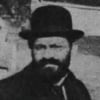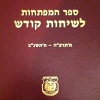ב"ה
Intellectual and Social History

Diachronic perspectives on the leadership and oral teachings of Rabbi Schneur Zalman of Liadi
A new anthology sheds new light on the historical development of his leadership, the crystallization of his ideology, and the impact of Rabbi Shlomo of Karlin and Rabbi Avraham of Kalisk on the emergence of Chabad.
|

Video | 36:52
Post-Modern Aspects of Chasidism and Their Significance for Jewish Society
A brief history of modernization within Jewish society and how various groups responded in very different ways to the threats of secularization and assimilation. The approaches of isolationism and outreach are compared and contrasted.
|

Video | 28:14
The Chabadization of Contemporary Orthodoxy
Certain non-chassidic leaders initially opposed the Chabad effort to spread Jewish learning and practice amongst all Jews. But these policies were later changed, and non-chassidic groups began to design programs which—in many ways—imitate Chabad practices.
|

Video | 44:17
The Innovative Communal Leadership of Rabbi Shalom DovBer of Lubavitch
Professor Naftali Loewenthal presents an overview of some of the major innovations of the 5th Chabad Rebbe, R. Sholom DovBer, with special focus on his founding of the Yeshiva Tomchei Temimim. Recorded at Chabad of Oxford University.
|

Video | 26:44
A Meditation System for a Young Woman, Riga 1939
An introduction to the subject of women and Torah study is followed by the study of a letter written by the sixth Chabad Rebbe, R. Yosef Yitzchak Schneersohn of Lubavitch, to an 18-year old Chassidic woman who belonged to a women's mystical study group in 1930s Riga.
|

100 years ago this month—unity, humanity and truth overcame a conspiracy of power and hate
In the Beilis trial of 1913 false accusations of ritual murder were leveled against the entire corpus of Torah teaching, the Jewish people generally, and the chassidic movement specifically. Ultimately, Beilis's acquittal was a bittersweet victory; the central problem had not been laid to rest.
|

The private journal of the Lubavitcher Rebbe reveals a dual vision for the future of humanity
In June 1941 Rabbi Menachem Mendel Schneerson, the future Lubavitcher Rebbe, arrived in Lisbon together with his wife, Rebbetzin Chaya Mushka (Moussia). Poised to leave Nazi-occupied Europe for the free world, an entry in the Rebbe’s private journal reveals how he drew on his past to chart a dual vision for the future.
|

How Rabbi Shneur Zalman of Liadi Successfully Preserved and Perpetuated the Teachings of The Baal Shem Tov
Can the teachings espoused by the Chabad school be regarded as authentically representative of the chasidic teachings of the Baal Shem Tov? Rabbi Yosef Yitzchak of Lubavitch concludes that the answer is yes. Nearly eight decades later, Prof. Immanuel Etkes arrived at the same conclusion.
|

Reading Between the Lines of the Lubavitcher Rebbe's Holocaust Era Calendar
Harnessing adversity as a paradoxical opportunity for good, the Ha-yom Yom calendar imbued time itself with a special urgency, encouraging and intensifying the study of Torah, the performance of mitzvot and the devotional service of God in an attempt to achieve salvation.
|

Sonia Rosenblum (1897-1974) was a woman whose stature as a scholar and practitioner of Chasidic teachings was known and recognized. A lengthy letter addressed to her by Rayatz inquires into the definitive essence of the human experiences of cognition and emotional excitement, and attests to her breadth and depth of mind when she was yet 19 years of age. This is the earliest documented example of a women who engaged in such studies at such an advanced level, which points to a broader phenomenon that predated any institutionalized infrastructure for the education of chasidic women.
|

Video | 45:07
Proto-Socialist Resonances in Chassidic Thought
Chabad struggled bitterly against communism's aggressively secular ethos, but successive Rebbes indicated that socialism and Judaism are not entirely at odds. This lecture was in tribute to Professor Chimen Abramsky.
|
Related Topics
- Kabbalah & Chassidism (3289)
Programs












